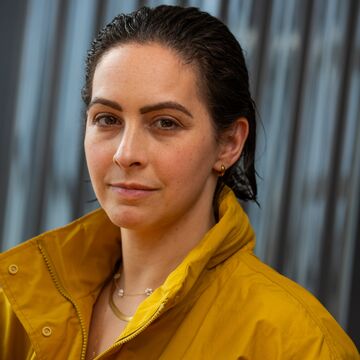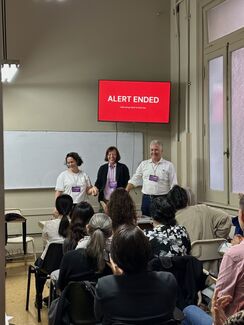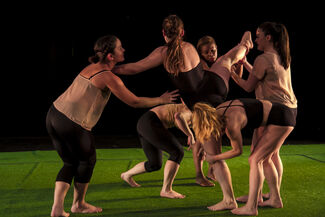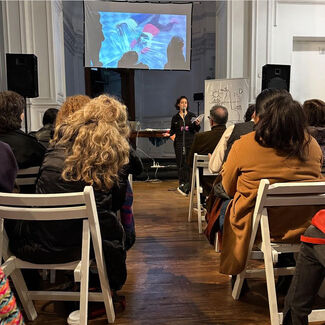

Lizzie Leopold
Assistant Professor
Contact
Bio
Dr. Lizzie Leopold (she/her) is a scholar of dance and performance studies and a dance maker, living in Chicago, Illinois. She served as the executive director of the Dance Studies Association (DSA) from 2019 to 2024 and as a lecturer in Theater & Performance Studies at the University of Chicago during those years. This precarious balance of scholarship, teaching, and administration allows a study of the field as it is experienced, from the critical contingencies that make it all run. For dance studies and adjacent fields, arts administration and academic administration are a quite complicated palimpsest. Having been a dancer/choreographer before turning to academia (another precarity within nonprofit structures), Lizzie holds an Interdisciplinary PhD in Theatre and Drama from Northwestern University, an MA in Performance Studies from New York University, and a BFA in Dance from the University of Michigan. Her published works include Staging Stars and Stripes: (Re)choreographing the American Flag (University Press of Florida, 2018), "The Merchant of Venice’s Missing Masque: Absence, Touch, and Religious Residues" (Oxford University Press, 2019), and "The Choreographic Commodity: Assigning Value and Policing Class for Nite Moves and William Forsythe" (University of Wisconsin Press, 2020).
She is currently co-editing a two-volume anthology on Chicago dance histories from the World's Fair to the present; Dancing on the Third Coast: Chicago Dance Histories (eds. Leopold and Susan Manning, under contract with the University of Illinois Press). Included in the anthologies, Leopold's essay on mid-century modern dancer Sybil Shearer explores the relationship of Shearer's work to questions of artistic legacy and choreographic valuation. Additional projects include Budget as Score: Performance as/is Capital, an early-stage scholarly and artistic collaboration with interdisciplinary artist Brendan Fernandes.
Broadly, Leopold's research is interested in the intersections of dance and the political economy of its production and circulation – asking questions about cultural and financial value. Lizzie was the director of Chicago-based modern dance company the Leopold Group from 2006-2018.
Awards: Links Hall Co-Mission resident artist (2018–2019); Outstanding Choreography, New York International Fringe Festival (Green Eyes, 2008). Publications: Dancing on the Third Coast: Chicago Dance Histories, co-edited two-volume anthology with Susan Manning under advance contract with the University of Illinois Press, expected 2025 publication; “Canonical Value and Valuation: The Choreographic Legacies of Sybil Shearer;" “Marxist Imaginaries and Foot-made Art: A Conversation Between Brendan Fernandes and Lizzie Leopold” in TURBA: The Journal for Global Practices in Live Arts Curation, 3.1 (2024); “Choreography” entry for The Methuen Drama Encyclopedia of Modern Theatre, edited by Colin Chambers Bloomsbury Publishing (2024); "The Choreographic Commodity: Assigning Value and Class for Nite Moves and William Forsythe" in Futures of Dance Studies, edited by Janice Ross, Rebecca Schneider, and Susan Manning, University of Wisconsin Press, (2020); “The Merchant of Venice’s Missing Masque: Absence, Touch, and Religious Residues” in Oxford Handbook to Shakespeare and Dance, edited by Brandon Shaw and Lynsey McCulloch, Oxford University Press (January 2019); "Staging Stars and Stripes: (Re)Choreographing the American Flag” in Perspectives on American Dance, edited by Jennifer Atkins, Sally R. Sommer, and Tricia Henry Young, University Press of Florida (January 2018); “Dancing Possibility and Privilege: Same Planet Performance Project with Ivy Baldwin” The Dance Center of Columbia College Chicago, On the Ground blog (March 2020); Book Review for Valuing Dance: Commodities and Gifts in Motion by Susan Leigh Foster, Dance Research, Volume 39, 2020; Book Review for Choreographing Copyright: Race, Gender, and Intellectual Property Rights in American Dance by Anthea Kraut, Dance Research Journal, Volume 49.1, April 2017.
Personal Statement
Holding up an organizational structure––the work of administrating––is creating space. Who is your space for and to what end? Administrative leadership demands both mission and action in tandem: statements of belief and actionable plans for implementation. If administration is about creating space, then perhaps research is about taking up space. There is an unavoidable politics to both, imbued with a responsibility that forwards an ethics of care, patience, and transparency. Do all of it together. Seek out collaborative work, collaborative authorship, and rich networks of support and resources whenever possible. Show up when you don’t need anything and offer resources in return.
In my research, dance and performance studies methods insist that my body is present in the work. My voice is never neutral, and I write myself into the scholarship without trying. Just as there is no organization without the people who make it run, there is no research without the researcher.
Follow the money and you will see how the values are lived. Strive for a model of abundance, not for a mindset of scarcity that looks only to capitalism as the sole measure of possibility. What resources do you have in plenty?
––
I come to teaching as a physical learner, as a dancer. I learn by doing and by seeing done. The classrooms that have engaged me most fully, whether studios or seminar rooms, have been energetic, lively spaces. Information was shared about text and the body through text and the body. I always strive to understand the students’ physical presence as both moving mind and inquisitive body, working towards a productive undoing of any mind/body dualism. Now, as an administrator and a scholar, I bring that idea to my commitment to the whole student. I am invested in wellness as an embodied and intellectual pursuit, in listening as an intention, and in choreography as a political possibility. Sharing a space, a classroom space, is already powerfully imbued with hierarchy––a site-specific choreography if you will.



